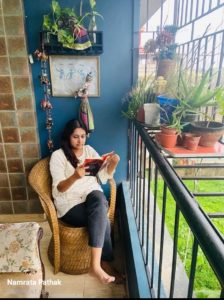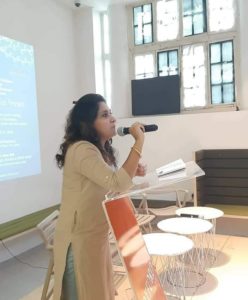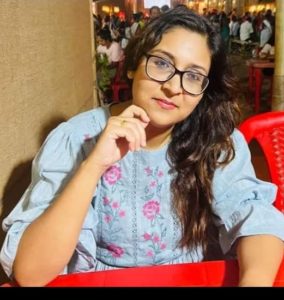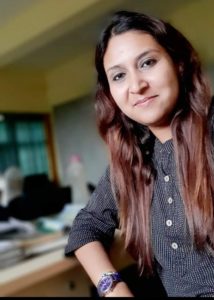Interviewed by Esha Chaudhuri
 As one navigates through the razzle-dazzle of the multitude of ongoing trends and its challenges, most might consider the channel of academe, a domain of less achievable pinnacles. However, few if not many prove this wrong. Sunday Shillong features the case of Assistant Professor, English at North-Eastern Hill University (NEHU), Tura campus, Dr. Namrata Pathak, who bears testimony to it, as she has been recently conferred with the prestigious Charles Wallace Fellowship. Engaging with Pathak on myriad counts, excerpts of the interview are as follows –
As one navigates through the razzle-dazzle of the multitude of ongoing trends and its challenges, most might consider the channel of academe, a domain of less achievable pinnacles. However, few if not many prove this wrong. Sunday Shillong features the case of Assistant Professor, English at North-Eastern Hill University (NEHU), Tura campus, Dr. Namrata Pathak, who bears testimony to it, as she has been recently conferred with the prestigious Charles Wallace Fellowship. Engaging with Pathak on myriad counts, excerpts of the interview are as follows –
SS: Congratulations on your most recent accolade, i.e., the fellowship. How does it feel?
NP: I am particularly hopeful because apart from the collaborative ventures that the fellowship will provide, it will also give me a space to work on the field of Performance Studies, my area of interest. The first hand experience of watching plays and also, getting to  know the exponents, practitioners, directors, and actors would be an enriching experience for me, both as a learner and academic. Moreover, I have to be a part of the academic scene at School of Oriental and African Studies (SOAS) and I am expected to take classes, give lectures, lead discussions, organise seminars and participate in the events of the University of London for three months. When I come back, I would use this piece of experience to add to the growth of students and I think, I have to give back to the people and the place that nourished me with their goodwill and love – my university fraternity at NEHU, Tura.
know the exponents, practitioners, directors, and actors would be an enriching experience for me, both as a learner and academic. Moreover, I have to be a part of the academic scene at School of Oriental and African Studies (SOAS) and I am expected to take classes, give lectures, lead discussions, organise seminars and participate in the events of the University of London for three months. When I come back, I would use this piece of experience to add to the growth of students and I think, I have to give back to the people and the place that nourished me with their goodwill and love – my university fraternity at NEHU, Tura.
SS: Broadly, what are your plans for the fellowship? What are you writing about?
NP: I am working on critical conversations on South Asian diasporic theatre by articulating  the new and topical engagements in drama and visual arts. During my time there, I plan to work in conjunction with theatre experts and practitioners from Royal Academy of Dramatic Art (RADA), London Academy of Music and Dramatic Arts (LAMDA), Guildhall School of Music and Drama (GSMD), and Drama Centre London, to name a few.
the new and topical engagements in drama and visual arts. During my time there, I plan to work in conjunction with theatre experts and practitioners from Royal Academy of Dramatic Art (RADA), London Academy of Music and Dramatic Arts (LAMDA), Guildhall School of Music and Drama (GSMD), and Drama Centre London, to name a few.
SS: Briefly, if you could give us a recap of your journey until now in academics, how would sum it all?
NP: Teaching is therapeutic for me. I have been teaching right from my PhD days at English and Foreign Languages University, Hyderabad, Telangana State (EFLU). I also worked for a short while in the Central University of Jharkhand (CUJ), Ranchi and Dibrugarh University, Assam. For me, every stint in the classroom instils new window views, enabling me to creatively engage with curious minds, beautiful minds. Breaking hierarchies, accommodating multiple viewpoints, creating a resplendent polyphony – what an interesting space the classroom transforms into! And let me  confide in you, I call myself a learner, not a teacher. Every teacher has to be a learner or else the entire process of learning will come to a standstill, right? (Pathak smiles)
confide in you, I call myself a learner, not a teacher. Every teacher has to be a learner or else the entire process of learning will come to a standstill, right? (Pathak smiles)
SS: A lot of your writings also focus on women – the female body, women in the midst of terror and insurgencies, et al. How do you position the role of women in the present order of things today?
NP: The recent book of mine that was published by Routledge was about an academic-activist, a woman who was instrumental in initiating peace talks between the Government of India and a banned militant outfit. As I was going through her writings, I could not help reimagining (and also, experiencing) a woman’s role in conflict zones, in violent peripheries, in regimented, restrictive spaces of the society. I have an array of questions here. What role does  a woman play in academia? How many women are policy makers? How many women administrators do we have?
a woman play in academia? How many women are policy makers? How many women administrators do we have?
SS: Whose writings have inspired you as well as given you the strength to pursue your own dreams? And how?
NP: There are so many authors in this regard who stirred my heartstrings and inspired me to flap my wings, and fly higher. Mitra Phukan, Dhruba Hazarika, Robin Ngangom, Kynpham Sing Nongkynrih, Janice Pariat, Kaushik Barua, Sumana Roy, Easterine Kire, Arundhati Subramanium, Tishani Doshi…the list is not going to come to an end, unfortunately.
SS: What are you currently reading and why would you recommend it?
NP: I am currently going through Avinuo Kire’s latest novel, Where the Cobbled Path Leads  (Penguin, 2022). Metaphorically, the mentioned path in the novel serves as a palpable freeway to the spectacle of nature, to an unbound space of communion and shared nourishment. The novel captures a child protagonist, Vime’s growth through love and loss, grief and joy and most importantly, it maps the vitality of change and transformation that myriad phases of life demand, also, a willingness to embrace life in its totality.
(Penguin, 2022). Metaphorically, the mentioned path in the novel serves as a palpable freeway to the spectacle of nature, to an unbound space of communion and shared nourishment. The novel captures a child protagonist, Vime’s growth through love and loss, grief and joy and most importantly, it maps the vitality of change and transformation that myriad phases of life demand, also, a willingness to embrace life in its totality.
SS: If there is any aspect that you’d like to alter/transform/reimagine in the current English curriculum, what would that be and why?
NP: The local ingredient has to be accommodated in whatever way we can as regional varieties make a curriculum robust and inclusive. I always look for experimentation in the choice of texts, thematic orientations and even the structure. Let me give you an interesting example. Shakespeare is a canonical playwright and is read in  both the undergraduate and postgraduate levels, but through Courses like Shakespeare in Films or Indianising Shakespeare: Texts and Performances we can not only localise Shakespeare, but we can also open up many dimensions in his texts. A text is not a static, unidirectional entity. It is layered and nuanced.
both the undergraduate and postgraduate levels, but through Courses like Shakespeare in Films or Indianising Shakespeare: Texts and Performances we can not only localise Shakespeare, but we can also open up many dimensions in his texts. A text is not a static, unidirectional entity. It is layered and nuanced.
SS: What message would you like to convey to the young and the aspirational readers?
NP: Choose the path less trodden and be persistent in your endeavour. Do what you love and love what you do. Have a voice. It is of utmost importance or else you will melt into the  crowd. The ability to stand alone and combat the antagonistic forces of life stem from your individual strength and courage. Your voice will take you far. Be it feeble, be it not loud. You stammer; you speak incoherently, nevertheless you speak. Creativity knows unbound freedom. If you are not free to express your opinion, the place is not democratic and in that place you cannot create! Then restructure the space or find egalitarian zones that would let your ideas thrive.
crowd. The ability to stand alone and combat the antagonistic forces of life stem from your individual strength and courage. Your voice will take you far. Be it feeble, be it not loud. You stammer; you speak incoherently, nevertheless you speak. Creativity knows unbound freedom. If you are not free to express your opinion, the place is not democratic and in that place you cannot create! Then restructure the space or find egalitarian zones that would let your ideas thrive.
—End of Interview—
Traversing through her journey as a writer, poet and academic researcher, shaped by a number of factors, Pathak carves a niche for herself through the Fellowship that enables academicians, researchers and students to explore their research for a given length of time at a host  university in the UK. Adding a feather to her cap, and yet another achievement for the state’s premier institution, she confidently stirs others to mirror this sort of fervent devotion.
university in the UK. Adding a feather to her cap, and yet another achievement for the state’s premier institution, she confidently stirs others to mirror this sort of fervent devotion.
Dr. Namrata Pathak is an academic and poet. She has an M.Phil and PhD from English and Foreign Languages University (formerly, CIEFL), Hyderabad. She has five books to her credit, and the latest are Indira Goswami: Margins and Beyond (Routledge, 2022) and A Reader on Arun Sarma (forthcoming from Sahitya Akademi this year). Her debut collection of poems, ‘That’s How Mirai Eats a Pomegranate’ was brought out in 2018 by Red River. Her poems are included in the Sangam House Monsoon Issue: ‘A Special on Poetry from North East’, July, 2019 and anthologies forthcoming from Aleph, Zubaan and other publishing houses.



